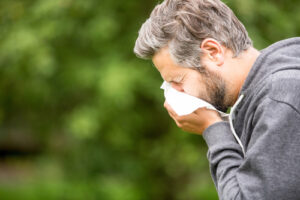How Do I Know If I Have Dry Eyes or Allergies?

This time of year, irritated eyes can make you wonder whether dryness or allergies are to blame. Since both can cause your eyes to be uncomfortable, it can be tricky to tell which condition is causing your symptoms.
However, once you familiarize yourself with a few key distinctions, you’ll be able to more easily identify whether dry eye or allergies is affecting you. By identifying the cause of your symptoms, you can seek the right kind of treatment and find relief.
Keep reading to learn how to know if you have dry eyes or allergies!
What Is Dry Eye Syndrome?
When it comes to conditions affecting the eyes, dry eye syndrome is one of the most common. In fact, more than ten million Americans experience ocular dryness.
In order for your eyes to be comfortable and function correctly, they must remain moisturized at all times. Your eyes get moisture from the tear film.
This is a layer of tears that coats the surface of your eyes each time you blink. If your body does not produce enough tears, or the tears produced are of poor quality, dry eye syndrome can result.
You may think of tears as just water, but they actually have three layers. In addition to a watery layer that provides lubrication, oxygen, and nutrients, there is a mucus layer and an oily layer.
Mucus makes it so tears can stick to the eye. The oil prevents tears from evaporating too quickly.
There are several glands located around the eye that produce the different components of tears. An issue with any of these tear-producing glands can affect the quality of tears, making it impossible for them to provide adequate lubrication.
What Can Cause Dry Eye to Develop?
Many factors can lead to the development of dry eye. It can simply be a part of aging, as the body produces less oil over time, especially for women.
Without sufficient oil, tears do not remain in the eye for long enough. Environmental factors can dry your eyes out.
For example, being outside on a hot, windy day or sitting in front of an air conditioning vent can make it difficult for your eyes to stay moisturized. Looking at a screen for an extended period of time can have this effect as well.
Dry eye can result from wearing contact lenses because contacts soak up tears. Certain medications, such as blood pressure medications and beta-blockers, can increase your risk of developing dry eye, as can certain conditions, like Parkinson’s and Sjogren’s.
What Are Allergies?
Almost a quarter of Americans are living with allergies. For many people, this can mean ocular irritation.

Allergies have to do with your immune system. The immune system protects your body from all kinds of foreign substances, such as bacteria and viruses. It’s your defense system.
Antibodies identify whether substances are harmful or not. When you have allergies, antibodies mistakenly identify an allergen as harmful, triggering a heightened response.
There are many types of allergies. Usually, allergic conjunctivitis is the type that leads to ocular symptoms. Dirt, dust mites, mold, pollen, and pet dander are common allergens that can irritate your eyes.
Once your body detects an allergen, it releases a chemical called histamine in an attempt to rid your system of the irritant. This is what causes an allergic reaction.
Allergies can affect you year-round or only during certain times of the year, such as springtime, when there is more pollen in the air.
Dry Eye Symptoms vs. Allergy Symptoms
Both dry eye and allergies can affect your eyes, but not in quite the same way. Plus, allergies often come with other symptoms that do not involve your eyes.
Common symptoms of dry eye include:

- An itching or burning sensation
- Eye fatigue
- Redness
- Blurry vision
- Excessive tearing
- Trouble wearing contacts
- Discomfort after activities like reading and watching TV
Common symptoms of allergies include:
- Itchy eyes, nose, and throat
- Sneezing and runny nose
- Redness
- Coughing
- Headache
- Sore throat
Generally speaking, the itchiness resulting from allergies is more intense than dry eye. It’s also important to look beyond your eyes and consider other symptoms.
If you’re experiencing other symptoms like a runny nose and headache, it’s more likely you are suffering from allergies.
Can You Have Both Dry Eye and Allergies?
Dry eye and allergies are not mutually exclusive. Unfortunately, it’s common to experience both.

When you already have dry eyes, allergies can make your symptoms even worse. Many people with chronic dry eye notice that their symptoms worsen in the springtime, when there is lots of pollen in the air. This only adds further irritation.
Dry eye syndrome can also make your allergies worse. This is because your eyes lack the moisture needed to flush out any irritants.
This leaves your eyes vulnerable to allergens. In addition, allergies are often treated with antihistamines.
These can have the side effect of negatively affecting tear production. If you find that the medication you are taking for your allergies is making your dry eye symptoms worse, talk to your eye doctor about your other medication options.
Are your irritated eyes in need of relief? Schedule an appointment at Complete EyeCare West in Columbus, OH, today!







